
-
Select format
-
- Publisher:
- Cambridge University Press
- Publication date:
- September 2009
- July 1999
- ISBN:
- 9780511485800
- 9780521651288
- 9780521030960
- Dimensions:
- (228 x 152 mm)
- Weight & Pages:
- 0.55kg, 258 Pages
- Dimensions:
- (228 x 152 mm)
- Weight & Pages:
- 0.398kg, 260 Pages
You may already have access via personal or institutional login
Book description
In this 1999 book, Julie Candler Hayes offers an ambitious reinterpretation of a crucial aspect of Enlightenment thought, the rationalizing and classifying impulse. Taking issue both with traditional liberal and contemporary critical accounts of the Enlightenment, she analyses the writings of Denis Diderot, Emilie Du Châtelet, the Abbé de Condillac, Buffon, d'Alembert and numerous others, to argue for a new understanding of 'systematic reason' as complex, paradoxical and ultimately liberating. Hayes examines the tensions between freedom and constraint, abstraction and materialism, linear and synoptic order, that pervade not only philosophic and scientific discourse, but also epistolary writing, fiction and criticism. Drawing on the insights of a wide range of theorists from Adorno, Habermas and Foucault to Deleuze and Derrida, she offers a dialogue between the eighteenth century and our own, an ongoing exploration of the question, 'what is Enlightenment?'.
Reviews
"readers, especially intellectual historians of science, will find her treatment of Enlightenment text rewarding." The Historian
"This is a rich and impressive study." International Studies in Philosophy, Harvey Chisick
Contents
Metrics
Altmetric attention score
Full text views
Full text views help Loading metrics...
Loading metrics...
* Views captured on Cambridge Core between #date#. This data will be updated every 24 hours.
Usage data cannot currently be displayed.
Accessibility standard: Unknown
Why this information is here
This section outlines the accessibility features of this content - including support for screen readers, full keyboard navigation and high-contrast display options. This may not be relevant for you.
Accessibility Information
Accessibility compliance for the PDF of this book is currently unknown and may be updated in the future.


